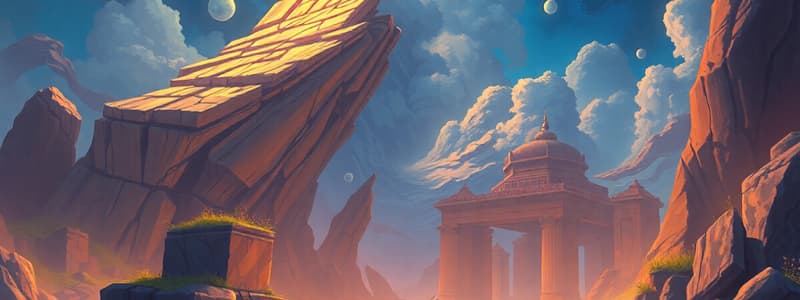Podcast
Questions and Answers
What is a key characteristic that defines a state in terms of power?
What is a key characteristic that defines a state in terms of power?
- Economic prosperity
- Legitimate use of violence (correct)
- Geographic expansion
- Cultural homogeneity
Which of the following best describes an exception to the definition of a state due to territory issues?
Which of the following best describes an exception to the definition of a state due to territory issues?
- Northern Cyprus created by Turks (correct)
- France's transition to democracy
- Switzerland establishing federation
- Republic of Ireland achieving independence
What aspect is essential to the concept of sovereignty in a state?
What aspect is essential to the concept of sovereignty in a state?
- Cultural influence
- Presence of a strong military
- Control over its internal and external affairs (correct)
- Economic stability
How does the rule of law contribute to state building?
How does the rule of law contribute to state building?
Which of the following illustrates a form of state building through conquest?
Which of the following illustrates a form of state building through conquest?
In what aspect do modern and historical roles of religion in state differ?
In what aspect do modern and historical roles of religion in state differ?
What does the term 'centralization' refer to in the context of state evolution?
What does the term 'centralization' refer to in the context of state evolution?
What role do judges and institutions play in building state power?
What role do judges and institutions play in building state power?
What significant change occurred in France due to the French revolutions?
What significant change occurred in France due to the French revolutions?
Which example illustrates a country achieving independence?
Which example illustrates a country achieving independence?
Which mechanism contributes to the consolidation of state rule?
Which mechanism contributes to the consolidation of state rule?
In what scenario is a centralized organization notably absent?
In what scenario is a centralized organization notably absent?
How were institutions viewed in the evolution of the state?
How were institutions viewed in the evolution of the state?
Which country exhibits a strong influence of religion despite its formal separation from the state?
Which country exhibits a strong influence of religion despite its formal separation from the state?
What is a key factor in establishing a federation or confederation?
What is a key factor in establishing a federation or confederation?
Flashcards
State's legitimate violence
State's legitimate violence
A state's right to use force is limited to authorized purposes and is subject to the rule of law.
State's defined territory
State's defined territory
A state has clear geographic boundaries.
State sovereignty
State sovereignty
A state's freedom from external control in its own territory.
State's population
State's population
Signup and view all the flashcards
Rule of Law
Rule of Law
Signup and view all the flashcards
State's centralized organization
State's centralized organization
Signup and view all the flashcards
State building: Absolutism
State building: Absolutism
Signup and view all the flashcards
State building: Independence
State building: Independence
Signup and view all the flashcards
Right to Torture
Right to Torture
Signup and view all the flashcards
State Sovereignty Exceptions
State Sovereignty Exceptions
Signup and view all the flashcards
Public vs. Private Life
Public vs. Private Life
Signup and view all the flashcards
State Building: Judge's Role
State Building: Judge's Role
Signup and view all the flashcards
State Building: Confederation vs. Federation
State Building: Confederation vs. Federation
Signup and view all the flashcards
State Building: Conquest or Unification
State Building: Conquest or Unification
Signup and view all the flashcards
State Legitimization
State Legitimization
Signup and view all the flashcards
Study Notes
Defining the State
- Legitimate use of violence (power)
- Right to use force, excluding torture
- Defined territory
- Exceptions: Cyprus (Turks creating Northern Cyprus)
- Sovereignty
- Population (citizenship, nationhood)
- Rule of law: laws publicly promulgated and equally enforced, with centralized organization.
- Exceptions: Bosnia Herzegovina
- Differentiation of public and private life
- Religion: once public matter, now not used for potentially public scandal
- Sexual orientation: once private, now potentially used for public scandal
- Religion: separated or not? (e.g., UK and Denmark not separated, Poland church influential but separate from the state on paper)
Foundation for State Building
- (No specific bullet points)
Creation of a State (Daalder)
- Absolutist rule: builds independent power via army and bureaucracy (France)
- French revolutions: transition to democracy
- Judges and institutions: strong enough to challenge the monarch (e.g., England)
- Establishing federations or confederations (e.g., Switzerland)
- Conquest or unification (e.g., Germany, Italy)
- Birth of nation states
- Achieving independence (e.g., Ireland)
Evolution of the State
- Consolidation of rule (legitimacy)
- Rationalization of rule
- Centralization, hierarchy, institutions
- Institutions as a new function (e.g., education)
- Extension of rule (maintaining power)
- Defense of the state (creating an army)
Nationhood and Citizenship
- Nation (invisible tie, age of enlightenment):
- Religion, tradition, language
- Western Europe: similar territorial nations, multi-ethnic empires
- Pluralism
- Post-communist era:
- Nation within borders, lacking citizenship (stateless people)
- Membership within a nation outside the country
Studying That Suits You
Use AI to generate personalized quizzes and flashcards to suit your learning preferences.




